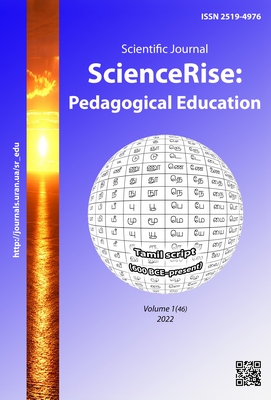The problem of determining the features of understanding the concept of «spiritual culture» as a component of self-realization of personality
DOI:
https://doi.org/10.15587/2519-4984.2022.253615Keywords:
spirituality, spiritual education of student's personality, spiritual education, humanizationAbstract
The article examines the impact of national and cultural values on socialization of a personality and its spirtual development. Main attention is related to the problem of education of value orientation, such as spiritual, human, national with have a significant influence on human socialization.
Purpose. Spiritual development of the person includes a system of ethical values and national cultural landmarks, which are implemented in the subjective selection of ideals, objective rating system and specific human behavior. One of the most important is a problem of education and preservation of spiritual values of the younger generation, cultural and spiritual values, which are the basis of human existence.
Methods The article analyzes the views of scientists to determine the spiritual values of national culture. They are formed during the historical development of the nation, development of its material and spiritual culture.
Results. The current period of society development requires new approaches to education and future generations. A measure of social development has always been a measure of cultural and spiritual nature of human.
Originality. Significant attention is given to nurturing influence of family in the formation of spiritual potential of a personality.
Conclusion. The biggest impact of all processes contradictions that occur suffers from, primarily, the family as the most important center of society. Changes, occurring in our country, promote the growth of the family role in the morality formation of the younger generation. It is saying about the impact of national and cultural values, which change in the formation of spiritual culture
References
- Bekh, I. D. (2003). Vykhovannia osobystosti. Osobystisno-oriientovanyi pidkhid: naukovo-praktychni zasady. Kyiv: Lybid, 344.
- Vasyliuk, R. A. (2014). Dukhovnyi svit suchasnoi ukrainskoi molodi: aspekty, problemy, perspektyvy. Available at: https://urok.osvita.ua/materials/education/38899/
- Vysotska, A. M. (2010). Osnovni napriamy diialnosti vykhovatelia spetsialnoho navchalnoho zakladu dlia rozumovo vidstalykh ditei. Aktualni problemy navchannia ta vykhovannia liudei z osoblyvymy potrebamy, 7, 246–254. Available at: http://nbuv.gov.ua/UJRN/apnvlop_2010_7_35
- Voronkova, V. H. (2000). Metafizychni vymiry liudskoho buttia (problemy liudyny na zlami tysiacholit). Zaporizhzhia: Pavel, 176.
- Voronkova, V. H. (2012). Filosofiia rozvytku suchasnoho suspilstva: teoretyko-metodolohichnyi kontekst. Zaporizhzhia: RVV ZDIA, 262.
- Hryva, I. A. (2014). Formuvannia zahalnoliudskykh moralnykh tsinnostei, dukhovnyi rozvytok uchniv na urokakh movy ta literatury, pryrodoznavstva. Shostka, 89.
- Desiatnyk, K. (2016). Dukhovnist osobystosti: aksiolohichnyi vymir. Skhidnoievropeiskyi natsionalnyi universytet imeni Lesi Ukrainky. Pedahohichnyi chasopys Volyni, 2 (3).
- Ziaziun, I. A. (2003). Dukhovna elita u suspilstvi: intelihentnist i hromadianskist. Problemy ta perspektyvy formuvannia natsionalnoi humanitarno-tekhnichnoi elity, 1 (5), 32–41.
- Melnyk, V. V. (2011). Sotsialno-filosofskyi analiz vzaiemovplyvu i vzaiemodii osobystosti i hlobalizovanoho sotsiumu. Humanitarnyi visnyk Zaporizkoi derzhavnoi inzhenernoi akademii, 46, 96–108.
- Deutsch, K. W. (2019). Tides among Nations. New York: Free Press, 301–305.
Downloads
Published
How to Cite
Issue
Section
License
Copyright (c) 2022 Larisa Likhitska, Lesya Starovoit

This work is licensed under a Creative Commons Attribution 4.0 International License.
Our journal abides by the Creative Commons CC BY copyright rights and permissions for open access journals.
Authors, who are published in this journal, agree to the following conditions:
1. The authors reserve the right to authorship of the work and pass the first publication right of this work to the journal under the terms of a Creative Commons CC BY, which allows others to freely distribute the published research with the obligatory reference to the authors of the original work and the first publication of the work in this journal.
2. The authors have the right to conclude separate supplement agreements that relate to non-exclusive work distribution in the form in which it has been published by the journal (for example, to upload the work to the online storage of the journal or publish it as part of a monograph), provided that the reference to the first publication of the work in this journal is included.







